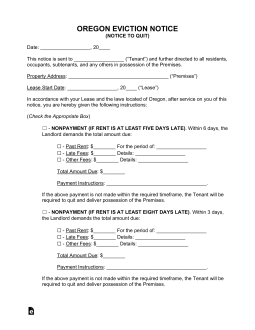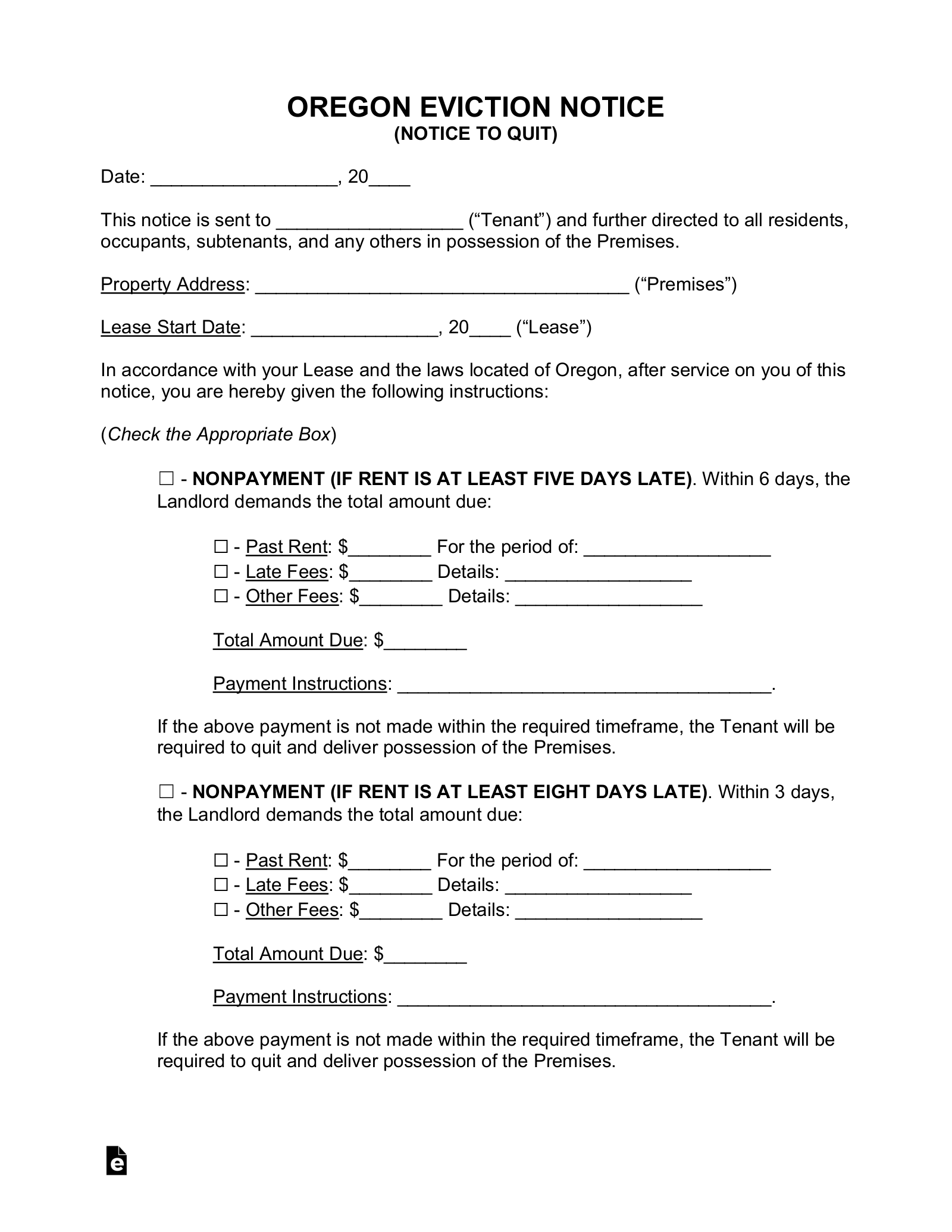Updated March 18, 2024
An Oregon eviction notice is a notice that a landlord gives to a tenant to inform them of a lease violation. The notice will describe the tenant’s offense and how they can correct the matter. If the tenant decides not to cure the issue, the landlord can file an eviction lawsuit in the Circuit Court.
By Type (4)
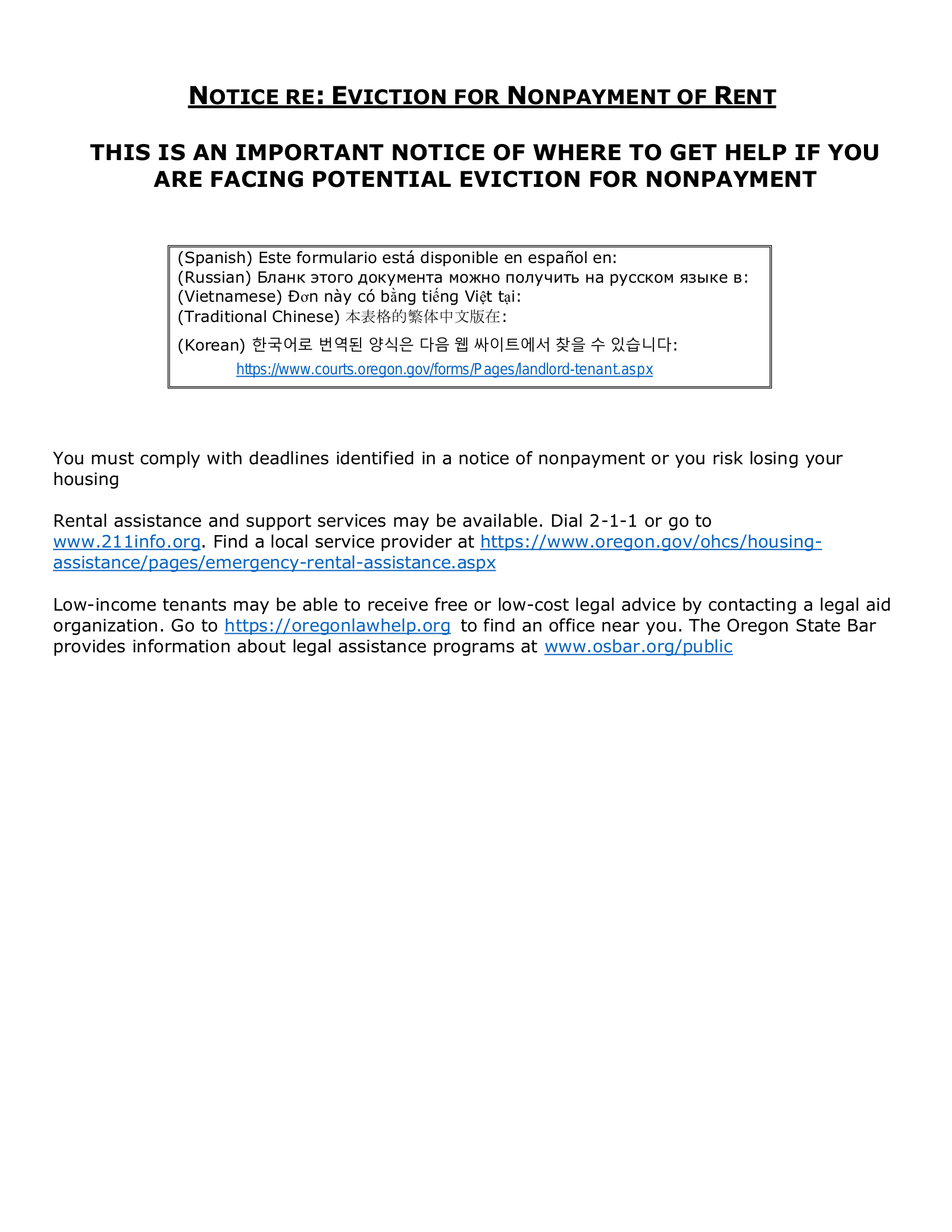 10-/13-Day Notice to Quit (Non-Payment of Rent) – The landlord may not serve this notice until after the fifth or eighth day the rent is late, depending on the length of the requisite time period. 10-/13-Day Notice to Quit (Non-Payment of Rent) – The landlord may not serve this notice until after the fifth or eighth day the rent is late, depending on the length of the requisite time period.
Download: PDF |
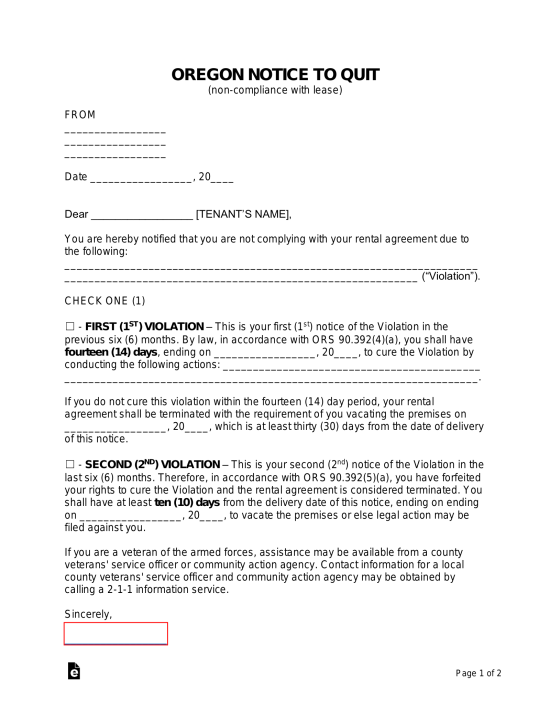 14-/10-Day Notice to Quit (Non-Compliance) – Gives 14 days for the tenant to fix the noncompliance or vacate the property at the end of 30 days. If it is the tenant’s second violation of the same violation in the last six months, the landlord can cancel the lease and require the tenant to vacate within 10 days’ notice. 14-/10-Day Notice to Quit (Non-Compliance) – Gives 14 days for the tenant to fix the noncompliance or vacate the property at the end of 30 days. If it is the tenant’s second violation of the same violation in the last six months, the landlord can cancel the lease and require the tenant to vacate within 10 days’ notice.
Download: PDF, MS Word, OpenDocument |
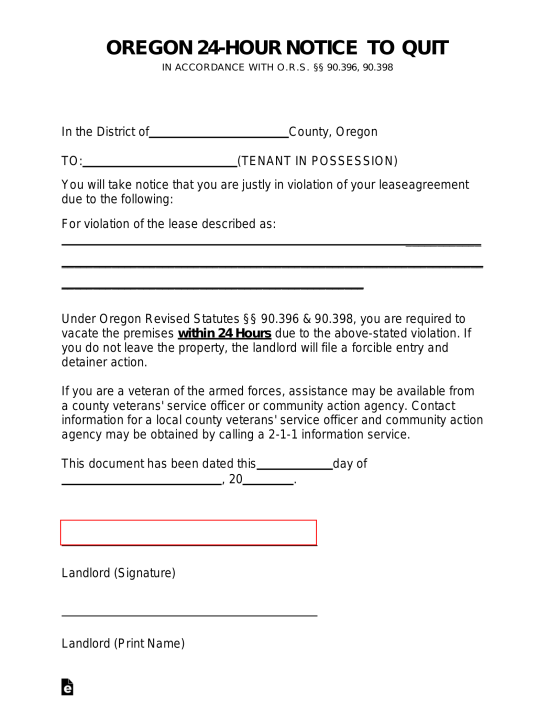 24-Hour Notice to Quit (Imminent Danger or Illegal Activity) – This notice may be served if the tenant is engaging in dangerous activities on the premises. 24-Hour Notice to Quit (Imminent Danger or Illegal Activity) – This notice may be served if the tenant is engaging in dangerous activities on the premises.
Download: PDF, MS Word, OpenDocument |
 30-Day Notice to Quit (Month-to-Month Tenancy) – This notice is to alert a party of the intention not to renew a month-to-month tenancy. 30-Day Notice to Quit (Month-to-Month Tenancy) – This notice is to alert a party of the intention not to renew a month-to-month tenancy.
Download: PDF, MS Word, OpenDocument |
Table of Contents |
Eviction Laws
- Rent Grace Period: 5 or 8 days, depending on the type of notice the landlord uses.[1]
- Non-Payment of Rent: 10 or 13 days.[1]
- Non-Compliance: 14 days; or 10 days for 2nd violation.[2]
- Imminent Danger or Illegal Activity: 24 hours.[3][4]
- Termination (Month-to-Month Lease): 30/90 days.[5]
- Eviction Lawsuit: Actions for Recovery of Real Property / Forcible Entry and Wrongful Detainer.[6]
Prohibited Landlord Actions
Utility Shutoff – If a landlord willfully interrupts heat, running water, hot water, electricity, or other essential service, the tenant may seek up to twice the monthly rent in damages.[7]
Changing the Locks – If a landlord unlawfully excludes the tenant from the premises, the tenant may seek up to twice the monthly rent in damages.[7]
Court Forms
Residential Eviction Complaint – After delivering the appropriate notice form to the tenant, the landlord will file this document to initiate the eviction process.
Residential Eviction Summons – Informs the tenant that an eviction action has been filed against them and that they must appear in court to settle the matter.
Residential Eviction General Judgment – Completed by the court to convey the judgment made during an eviction hearing.
Answer to a Residential Eviction – Once a tenant receives an eviction summons, they may respond to the court with this document which allows them to indicate why they are entitled to retain possession of the premises.
Oregon Eviction Information for Landlords – Information on court process for landlords.
Oregon Eviction Information for Tenants – Information on court process for tenants.
How to Evict a Tenant (4 steps)
- Provide Notice to Tenant
- File Complaint and Summons with Circuit Court
- Serve Complaint and Summons on Tenant
- Attend Court Hearing
2. File Complaint and Summons with Circuit Court
Once the requisite time period has elapsed and the tenant has failed to respond to the notice provided by the landlord, the landlord may seek redress in the Circuit Court representing the county in which the property is located.
To begin an eviction case, the landlord must file a Residential Eviction Complaint and a Summons and pay a $88 filing fee and a trial fee, if any.[8] In addition, the landlord must provide copies of the notice they delivered to the tenant.
3. Serve Complaint and Summons on Tenant
Once it has been filed, the court clerk will give you a copy of the summons and complaint to serve on the tenant. The tenant must be served by the end of the day after the day the complaint was filed. The tenant will have the right to submit an Answer Form and defend themselves.
4. Attend Court Hearing
The court will set a date for a hearing. If the tenant fails to show up or the court finds in favor of the landlord, the court will issue a Judgment and the tenant will be obligated to move out.

